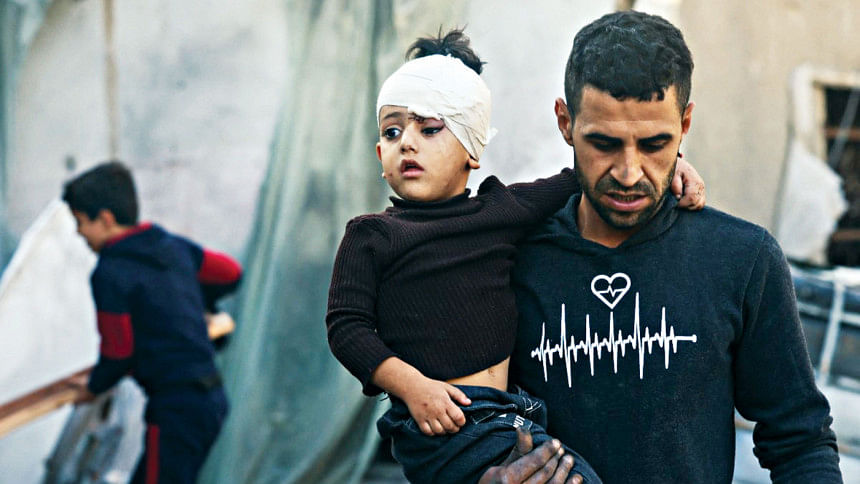Israel bombards southern Gaza
Israeli war planes and artillery bombarded the south of the Gaza Strip yesterday, hitting mosques, homes and close to a hospital, after the collapse of a truce in the nearly two-month-old war between Israel and Hamas.
Residents feared the barrages were a prelude to an Israeli ground operation in the south of the Palestinian territory which would bottle them up in a shrinking area and possibly try to push them into neighbouring Egypt.
The Gaza health ministry said at least 240 Palestinians had been killed and 650 wounded since the truce ended on Friday morning. More than 15,000 Palestinians have been killed in Gaza since the war started on October 7, according to AFP.
The Israeli military said that in the last 24 hours combined attacks by its ground, air and naval forces had hit 400 targets and killed an unspecified number of Hamas fighters.
Meanwhile, French President Emmanuel Macron warned that Israel’s aim of eliminating the Palestinian group Hamas risked unleashing a decade of war.
Achieving the “total destruction of Hamas” would mean “the war will last 10 years”, Macron said at a press conference on the sidelines of the UN’s COP28 climate talks in Dubai, reports AFP.
“So this objective must be clarified,” he added.
The president said France was “very concerned” by the resumption of violence in Gaza and that he was heading to Qatar to help in efforts to kickstart a new truce ahead of a ceasefire, reports Reuters.
A temporary truce between Israel and Hamas collapsed on Friday after mediators were unable to extend it. Israel and Hamas have traded blame over the collapse.
“There is no lasting security for Israel in the region if its security is achieved at the cost of Palestinian lives and thus of the resentment of public opinions in the region. Let’s be collectively lucid,” Macron added.
The head of the International Red Cross said the renewed fighting was intense.
“It’s a new layer of destruction coming on top of massive, unparalleled destruction of critical infrastructure, of civilian houses and neighbourhoods,” Robert Mardini told Reuters in Dubai.
With conditions inside the Hamas-ruled enclave reaching “breaking point”, in Mardini’s words, the first aid trucks since the end of the truce entered Gaza through the Egyptian side of the Rafah crossing yesterday, Egyptian security and Red Crescent sources said.
During the truce, Hamas released hostages in exchange for Palestinian prisoners held in Israeli jails.
But yesterday, Deputy Hamas chief Saleh Al-Arouri told the pan-Arab Al Jazeera TV that no more prisoners would be exchanged with Israel until there was a ceasefire in Gaza.
“Let the war take its course. This decision is final. We will not compromise on it,” Arouri said.
Meanwhile, Israel yesterday said it had recalled a Mossad team from Qatar, host of indirect negotiations with Hamas, accusing the Palestinian faction of reneging on a deal which entailed the freeing of all children and women hostages.
In yesterday’s bombardment, the Khan Younis and Rafah were pounded. Residents said strikes hit houses and three mosques in Khan Younis.
Displaced Gazans have been sheltering in Khan Younis and Rafah because of fighting in the north of the densely populated enclave, but residents said they feared Israeli troops were preparing to move on the south.
“This is the same tactic they used before entering Gaza and the north,” said Yamen, who gave only his first name.
Yamen fled to Deir Al-Balah in central Gaza from the north after Israel destroyed several districts there.
“Where to after Deir Al-Balah, after Khan Younis? I don’t know where I would take my wife and six children,” he said.
londonGBDESK//



Comments are closed.